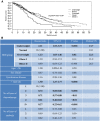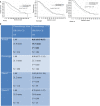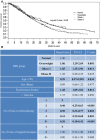Association of BMI with overall survival in patients with mCRC who received chemotherapy versus EGFR and VEGF-targeted therapies
- PMID: 26211512
- PMCID: PMC4618617
- DOI: 10.1002/cam4.490
Association of BMI with overall survival in patients with mCRC who received chemotherapy versus EGFR and VEGF-targeted therapies
Abstract
Although a raised body mass index (BMI) is associated with increased risk of colorectal cancer (CRC) and recurrence after adjuvant treatment, data in the metastatic setting is limited. We compared overall survival (OS) across BMI groups for metastatic CRC, and specifically examined the effect of BMI within the group of patients treated with targeted therapies (TT). Retrospective data were obtained from the South Australian Registry for mCRC from February 2006 to October 2012. The BMI at first treatment was grouped as underweight <18.5 kg/m(2) , Normal = 18.5 to <25 kg/m(2) , Overweight = 25 to <30 kg/m(2) , Obese I = 30 to <35 kg/m(2) , Obese II ≥35 kg/m(2) . Of 1174 patients, 42 were underweight, 462 overweight, 175 Obese I, and 77 Obese II. The OS was shorter for patients who were underweight and overweight compared to normal (OS 13.7 and 22.3 vs. 24.1 months, respectively, hazard ratio [HR] 2.21 and 1.23). The adjusted median OS was longer for normal versus overweight or obese I patients receiving chemotherapy + targeted therapy (35.7 vs 25.1 or 22.8 months, HR 1.59 and 1.63, respectively) with no difference in OS for chemotherapy alone. On breakdown by type of targeted therapy, overweight and obese I patients had a poorer outcome with Bevacizumab. The BMI is predictive of a poorer outcome for underweight and overweight patients in the whole population. Of those receiving chemotherapy and targeted therapy, BMI is an independent predictor for OS for overweight and obese I patients, specifically for those treated with Bevacizumab. Patients who are overweight or obese (group I) may be a target group for lifestyle and nutrition advice to improve OS with TT.
Keywords: BMI; Bevacizumab; colorectal cancer; metastatic; targeted therapies.
© 2015 The Authors. Cancer Medicine published by John Wiley & Sons Ltd.
Figures



Similar articles
-
Influence of body mass index on outcome in advanced colorectal cancer patients receiving chemotherapy with or without targeted therapy.Eur J Cancer. 2011 Nov;47(17):2560-7. doi: 10.1016/j.ejca.2011.06.038. Epub 2011 Jul 29. Eur J Cancer. 2011. PMID: 21803570 Clinical Trial.
-
Role of first-line anti-epidermal growth factor receptor therapy compared with anti-vascular endothelial growth factor therapy in advanced colorectal cancer: a meta-analysis of randomized clinical trials.Clin Colorectal Cancer. 2015 Jun;14(2):81-90. doi: 10.1016/j.clcc.2014.12.011. Epub 2015 Jan 9. Clin Colorectal Cancer. 2015. PMID: 25666296
-
Overweight is associated to a better prognosis in metastatic colorectal cancer: A pooled analysis of FFCD trials.Eur J Cancer. 2018 Jul;98:1-9. doi: 10.1016/j.ejca.2018.03.031. Epub 2018 May 26. Eur J Cancer. 2018. PMID: 29807237
-
Targeted therapy for metastatic colorectal cancer: role of aflibercept.Clin Colorectal Cancer. 2013 Jun;12(2):73-85. doi: 10.1016/j.clcc.2012.08.001. Epub 2012 Oct 24. Clin Colorectal Cancer. 2013. PMID: 23102896 Review.
-
Biomarker-driven EGFR therapy improves outcomes in patients with metastatic colorectal cancer.Expert Rev Anticancer Ther. 2014 Sep;14(9):1051-61. doi: 10.1586/14737140.2014.922881. Epub 2014 Jun 5. Expert Rev Anticancer Ther. 2014. PMID: 24898788 Review.
Cited by
-
Biological factors driving colorectal cancer metastasis.World J Gastrointest Oncol. 2024 Feb 15;16(2):259-272. doi: 10.4251/wjgo.v16.i2.259. World J Gastrointest Oncol. 2024. PMID: 38425391 Free PMC article. Review.
-
Effect of body mass index on survival in patients with metastatic colorectal cancer receiving chemotherapy plus bevacizumab: a systematic review and meta-analysis.Front Nutr. 2024 Jul 16;11:1399569. doi: 10.3389/fnut.2024.1399569. eCollection 2024. Front Nutr. 2024. PMID: 39081675 Free PMC article.
-
Association between quantitative CT body composition analysis and prognosis in cetuximab-based first-line treatment for advanced colorectal cancer patients.BMC Cancer. 2024 Dec 26;24(1):1579. doi: 10.1186/s12885-024-13338-8. BMC Cancer. 2024. PMID: 39725871 Free PMC article.
-
Association of Obesity With Survival Outcomes in Patients With Cancer: A Systematic Review and Meta-analysis.JAMA Netw Open. 2021 Mar 1;4(3):e213520. doi: 10.1001/jamanetworkopen.2021.3520. JAMA Netw Open. 2021. PMID: 33779745 Free PMC article.
-
Bevacuzimab May Be Less Effective in Obese Metastatic Colorectal Cancer Patients.J Gastrointest Cancer. 2019 Jun;50(2):214-220. doi: 10.1007/s12029-017-0047-2. J Gastrointest Cancer. 2019. PMID: 29302856
References
-
- Sassi F, Devaux M, Cecchini M. Rusticelli E. The obesity epidemic: analysis of past and projected future trends in selected OECD countries. Paris, France: OECD Publishing; 2009.
-
- Dignam JJ, Polite BN, Yothers G, Raich P, Colangelo L, O'Connell MJ, et al. Body mass index and outcomes in patients who receive adjuvant chemotherapy for colon cancer. J. Natl. Cancer Inst. 2006;98:1647–1654. - PubMed
-
- Renehan AG, Tyson M, Egger M, Heller RF. Zwahlen M. Body-mass index and incidence of cancer: a systematic review and meta-analysis of prospective observational studies. Lancet. 2008;371:569–578. - PubMed
-
- Meyerhardt JA, Catalano PJ, Haller DG, Mayer RJ, Benson AB, III, Macdonald JS, et al. Influence of body mass index on outcomes and treatment-related toxicity in patients with colon carcinoma. Cancer. 2003;98:484–495. - PubMed
MeSH terms
Substances
LinkOut - more resources
Full Text Sources
Other Literature Sources
Medical
Research Materials
Miscellaneous

